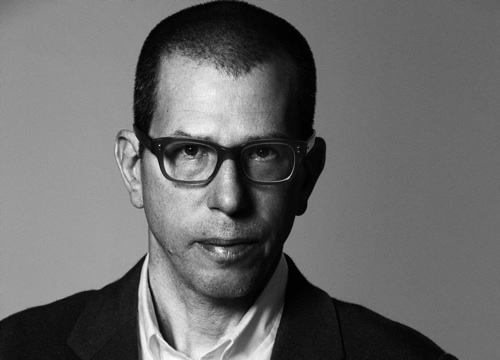Jules Evans interviews Jonathan Newhouse CEO of Conde Nast, about his practice of Stoic philosophy….
 As part of my continued fascination with how people use ancient philosophies in modern life, I went to interview Jonathan Newhouse, chairman of Conde Nast International, which publishes the non-US editions of magazines like Vogue, GQ, Vanity Fair, Glamour and House and Garden. How, I wondered, did Jonathan follow Stoic philosophy in such an image-focused industry? And how did it help him with the pressures of being born into one of the most affluent and successful families in America? Unlike the stars who adorn his magazine covers, Jonathan is a very private person, and this is the first time he’s talked about his love of Stoicism, but he was kind enough to share his thoughts.
As part of my continued fascination with how people use ancient philosophies in modern life, I went to interview Jonathan Newhouse, chairman of Conde Nast International, which publishes the non-US editions of magazines like Vogue, GQ, Vanity Fair, Glamour and House and Garden. How, I wondered, did Jonathan follow Stoic philosophy in such an image-focused industry? And how did it help him with the pressures of being born into one of the most affluent and successful families in America? Unlike the stars who adorn his magazine covers, Jonathan is a very private person, and this is the first time he’s talked about his love of Stoicism, but he was kind enough to share his thoughts.
How did you get into Stoicism?
It was 1999. I ran into Alain de Botton in a restaurant. He was having dinner with a friend of mine. He said he was working on a book of philosophy, and mentioned Seneca, who I’d never read. I went out and brought Seneca’s Letters From a Stoic. And it just blew me away. I found it impeccably logical. That led me on to Marcus Aurelius and Epictetus. I read just about everything I could. Now I usually take one of the Stoic books with me when I travel. I incorporated it into my thinking and it’s shaped the way I think and interact with the world in a very positive way.
How?
What struck me was the irrefutable logic of it. People devote a lot of time and emotional effort to things that are beyond their control – what other people do, how other people react to them, even the weather. And they set themselves up for pain, anxiety, disappointment and fear. The Stoics recognised that it was foolish, or counterproductive, to attach oneself to things that are beyond one’s control, when there are things within one’s control – one’s thoughts, attitudes and moral purpose.
I loved the idea that you could make your goal to live a life of moral purpose. I was very taken with the ethical and moral point-of-view of Stoicism. When you read the Stoics, you often come across the word ‘virtue’. They saw the goal of the wise person as to lead a virtuous life. Today, the word ‘virtue’ is almost never heard, except ironically. If you asked 100 people what their goal was in life, hardly any would say leading a virtuous life.
Can you give some practical examples of how you might use Stoic ideas?
I found I had a more satisfactory way of dealing with disappointment, opposition…For example, I had children, who are grown up now and in their twenties. Parents care a lot about their children and what they do, and it’s very easy to get upset when they don’t behave as you would wish them to. Stoicism makes you realise you can’t control people, not even your own children. It’s liberating. The essence of Stoicism is that you have to accept what you can’t control. I’d get upset or disappointed when things didn’t go my way or when someone didn’t do what I wanted, but I learnt to step back and say ‘what’s going on? Does it involve my moral purpose?’ If it does, then as a wise person you have a path to follow, which is to follow the path governed by reason and virtue. And if it doesn’t involve your moral attitude, then it’s probably not that important. Let me read you one of my favourite quotes from Marcus Aurelius:
They cannot admire you for intellect. Granted—but there are many other qualities of which you cannot say, “but that is not the way I am made”. So display those virtues which are wholly in your own power—integrity, dignity, hard work, self-denial, contentment, frugality, kindness, independence, simplicity, discretion, magnanimity. Do you not see how many virtues you can already display without any excuse of lack of talent or aptitude? And yet you are still content to lag behind.
What he’s saying is you can make your goal to live in a dignified way, a virtuous way based upon reason. It is within your power. How many people do that? Where people get screwed up is there are a lot of things that appear to be in our control – whether we achieve something we want to achieve, whether a relationship works out the way we want. The fact is we can influence them, but ultimately a lot of these things are beyond our control. Even our health.
But isn’t that a heresy in the world of business philosophy, where most people think success is all down to your own efforts. You seem to be saying that some of these things involve fortune and luck.
Fortune and luck play a huge part in everything. Stoicism doesn’t mean passivity – you can care and you can be passionate. Let’s say you’re a writer — your duty is to write the best you can. But it’s out of your control whether your book becomes a bestseller or not. Other people have to buy it, a publisher has to publicise it, maybe you have to get on a TV talk show. But nothing can prevent you from living according to the precepts of Stoicism.
Is it easier to be Stoic when you’re well off?
A lot of things are easier if you’re well-off, and probably a few things aren’t as easy. Marcus Aurelius was emperor of Rome, hugely powerful. And Epictetus was a slave. So I don’t think Stoicism is just a luxury for advantaged people. Any person can learn from it.
Marcus was emperor of Rome, which must have been an incredibly complex and stressful job. You also, in some ways, are at the top of an empire, a media empire, which must also be very complex. Does Stoicism help you in that?
I don’t think it impacts how I run the business, to be honest. I don’t look at the business every day and think ‘what’s the Stoic way to do a certain thing’. What it does do is help me manage myself and my own feelings. There’s not very much that disturbs my equanimity. I can have a detachment and calmness in doing what I do. I don’t get offended if someone I do business with lets me down, I just recognise this is the way some people behave. It reminds me of a quote from Marcus Aurelius I was looking at this morning:
Whenever you are offended at someone’s lack of shame, you should immediately ask yourself, ‘is it possible for there to be no shameless people in the world?’ It’s not possible – do not ask for the impossible. This person is just one of the shameless inevitably existing in this world.
If someone is behaving in a rude way, step back and say ‘OK that’s their problem. What’s my responsibility? Mine is to follow the precepts of truth, justice, courage and self-control’. Nothing can prevent you from doing that. If you ask most people, do you think you can achieve your goal, people would say, maybe I will, maybe not. If your goal is to live according to reason and virtue, then that is always achievable. I’d never thought of that.
Did you grow up with a particular religion?
I’m from the US, from the New York area. I grew up as a reformed Jew, with the Judeo-Christian moral precepts that most people are exposed to. I was never a seeker after truth. I didn’t join cults or experiment with philosophies or sects. I wasn’t particularly looking for some kind of answer.
To what extent is the world of media and fashion in tune with Stoic values?
 Not in tune. I don’t think there’s any particular awareness of it. In fact, the zeitgeist has been moving away from Stoic virtues. For example, the Stoics thought humans have the capacity for reason as well as passions. They saw passions as the antithesis to reason and kind of the wrong path. But today we put a great value on emotions, and living your emotions and experiencing them and giving into them. The idea of applying a reasoned approach is not in line with today’s thinking.
Not in tune. I don’t think there’s any particular awareness of it. In fact, the zeitgeist has been moving away from Stoic virtues. For example, the Stoics thought humans have the capacity for reason as well as passions. They saw passions as the antithesis to reason and kind of the wrong path. But today we put a great value on emotions, and living your emotions and experiencing them and giving into them. The idea of applying a reasoned approach is not in line with today’s thinking.
And also, you could say that media has led to a culture of external display rather than the idea of inner virtue?
Digital has made possible an incredible explosion of narcissism. Through Facebook and Instagram, people are displaying everything about their personal lives. I like the fact that Stoicism is private. I’ve never felt an interest in proselytizing it. I do, however, sometimes talk to close friends about it. For example, about a year ago, a friend of mine in the US lost his wife in a shooting accident. He was devastated. I sent him a book of Seneca about consolation. He thanked me for it. I don’t know if it touched him. But occasionally, when I’ve come across someone who I thought would benefit, I’ve given him a book.
For example, I noticed you stood by John Galliano in that whole furore.
Well, in that case I felt he’d been suffering from severe alcoholism, which is an illness. And he was taking steps to recover. And the right thing to do when someone is sick is to have compassion and to support their recovery.
Going back to the idea of proselytizing – Marcus Aurelius also clearly thought you can’t change people so there was no point trying to do ‘Stoic outreach’. Do you think then that we can’t promote these ideas or values through the media?
Individuals should do what they want. If people feel strongly about it, they should write a book, or talk about it. I have no intention of fighting any battle to spread Stoicism. It’s out there – you can walk into a bookshop and buy Marcus Aurelius. A lot of ancient philosophies have something to offer. What’s happened today, which is a shame, is that when people have problems and suffering, their instinct is to go to a psychiatrist and get a pill. Some misfortunes require medication, but pills aren’t the answer to all our problems.
I do think we should teach a whole range of philosophies in schools. In the 16th or 17th centuries, every educated household had a copy of Seneca in their library. Now it would be less than 1% who’d have a copy. They’ve been neglected.
Have you ever met other people interested in Stoicism?
No, there’s no other person I could discuss this with, apart from Alain de Botton.
 Elle MacPherson named her son Aurelius after the author of her favourite book, Aurelius’ Meditations.
Elle MacPherson named her son Aurelius after the author of her favourite book, Aurelius’ Meditations.You must have met so many people. None of them were into Stoicism? Tom Wolfe for example? Elle MacPherson?
I’ve sat next to Elle at dinner parties. I didn’t realise this was one of her intellectual interests! For me, it’s a private thing.
That’s quite different from, say, Judaism, where there’s so much emphasis on community.
Well, Stoics don’t all meet in church and worship. The Stoics make mention of God, but the deity does not play a major role. It’s a way of thinking, a philosophy, and you don’t need anyone else to share it with. I’m happy if someone else is interested in it. I’ve occasionally talked to friends about it and they nod and say ‘that’s nice’, but I don’t have friends that I hang out with in a bar and talk about Stoicism.
Do you believe in God?
That’s an interesting question. [Pause]. I guess…is there a God that is looking at every single detail of every life in the universe, you know, if Johnny is praying to pass his biology exam, is God listening to that prayer? I don’t know. To me, the principles that are embodied in Stoicism are akin to God. I’m not sure if God exists, but I prefer to live my life as though He does.
The Stoics believed in a moral universe. Do you?
Well, they’d say it all comes down to reason. They saw their moral values as stemming from reason, which enables us to live in a peaceful and harmonious way.
But they also saw a link between reason and the universe.
Yes they did. You know…I haven’t worked it out. This sounds terrible, perhaps, but I love the idea of God. For me, this philosophy itself is godlike – almost like a Higher Power, something greater than my own power, which is puny.
And what about the afterlife?
Well, I think when you’re dead, it’s probably like before you’re born. There’s no consciousness, no pain, no nothing. It’s frightening, but it will happen to all of us, and I can accept it. That’s the way God or Nature made the world, and to protest against it or to feel anguish is foolish and irrational, so why indulge it? You know when you jump into a swimming pool, there’s a moment when you know you’re going to go from one state to another, and then it happens. I think death is something like that. Except you won’t be swimming afterwards. Anyway, Stoicism has made me less afraid of dying.
I left with the impression of a man with a quiet and deep integrity. Of course, I still wondered if the media could perhaps play a role in trying to shape more positive values in our culture, but Jonathan is not alone among Stoics in being wary of proselytizing. Still, occasionally some Stoic philosophy sneaks into one of his family’s magazines – like in 1955, when JD Salinger published Franny and Zooey in the New Yorker. In the story, Zooey scrawls some Epictetus quotes across her school’s blackboards. Good going Zooey.
This article was first published on Jules Evan’s website in October 2013, and is reprinted here with his kind permission.





For me, this interview is as good as it gets. It hit all my favourites: Epictetus, Marcus Aurelius, Seneca. At times the resonance with my own experience was almost eerie. For example, Jonathan quoted word for word what my late mother said about death. She saw her death as her material existence, including the flickering of the neurons in her brain, as returning to where everything had been for billions of years before she was born. She had Marcus Aurelius’ meditations by her bedside when she died.
Also like Jonathan I never meet people interested in stoicism which I can only see as their loss. I really liked this one. Thanks Patrick.
A very good article. I liked its “clean lines” and sense of restraint – and the absence of any overly elaborate decoration of the message through the use of exaggerated adjectives. A good “artifact”, in my mind”, from someone living and practicing “the dignified life” that he referred to. I also agree with him about avoiding proselytising. To expect the media to promote the growth of Stoicism, a philosophy that its practitioners probably do not understand and do not sympathise with, will always be an exercise in futility. Stoicism lives and grows only as individuals awaken, in their own time and their own way, to the benefits of embracing and living a Stoic life. – David Allen
Thank you for sharing, I enjoyed reading this article and gained from it.